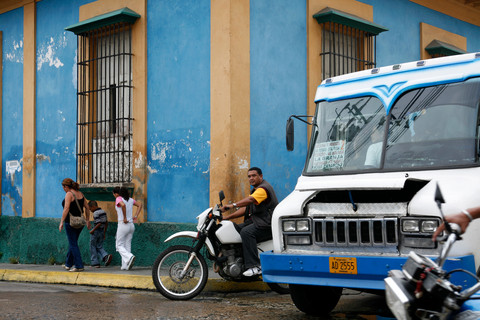ETH4D Doctoral Scholarships

ETH4D Doctoral Scholarship Programme
The ETH4D Doctoral Scholarship Programme supports scholars from low- and lower-middle-income countries to conduct research at ETH, particularly on (but not limited to) innovations that have the potential to improve the lives of people in poorer regions of the world.
After their doctoral studies, fellows have excellent prospects of becoming leaders in sustainable development by taking up important positions in academia, policy or industry, or by putting research into practice through entrepreneurship.
The grant sum covers 200'000 CHF of salary and research costs towards a four-year PhD. ETH professors cover the remaining costs (typically amounting to the fourth year of the PhD).
Please refer to the Download Eligibility and Criteria document (PDF, 201 KB) before applying.
For more information about finding a supervisor, see this page.
- The Download general entrance requirements (PDF, 1.2 MB) for doctoral studies at the ETH Zurich and the respective department must be fulfilled.
- Experience in the selected research area is required.
- Applicants should be citizens of least-developed, low-, and lower-middle-income countries according to the external page OECD DAC-2024-2025 list. Applications from least-developed and lower-income countries will be prioritized.
- The doctoral supervisor must be an ETH professor and must have a guaranteed ETH position for the entire duration of the proposed project. Candidates may be co-supervised by advisors at at a Federal Research Institute (Eawag, Empa, PSI, & WSL), but they must also have an advisorship from a professor at ETH Zurich.
- It is expected that the ETH Zurich professor supports the candidate in elaborating the full proposal, if the concept note should be selected, and to supervise the candidate, if the full proposal is selected for funding.
- The supervisor confirms their commitment to the project by a letter of support, indicating their financial contribution to the project. Supervisors must contribute the remaining salary costs of a four-year PhD.
- The research topic is within the thematic scope of ETH Zurich.
- The proposal is a new doctoral project, not complementary funding to an on-going research.
- Priority will be given to projects which develop methods, technologies, tools or products that generate a direct impact for underprivileged people in low-income countries, and which take into account the ecological, socio-economic, and cultural context.
- Projects involving research partners from a low-income country must be based in the external page KFPE Principles for Transboundary Research Partnerships.
- All partners are involved in project formulation and development.
- All partners make a substantial in-kind or cash commitment.
- The project is integrated in the general activities of the involved institutions.
- Projects must include partners from countries on the external page OECD DAC-2024-25 list.
The next application cycle will open in winter 2025.
Applicants may submit the Concept Note Application Form 2025 to the ETH4D programme office by e-mail to . Only concept notes fulfilling all indicated requirements and received during the active cycle will be taken into consideration. Please note that ETH4D is unable to provide matchmaking services between professors and potential scholarship applicants.
Application Documents
The concept note application must include:
- Completed Download Concept Note Application Form 2025 (DOCX, 38 KB)
- CV of the candidate (max. 2 pages)
- Motivation letter of the candidate with career intentions
- Excellent MSc degree from a recognised university and grade transcripts
- Support letter of the supervising professor at ETH Zurich, stating financial contribution to cover remaining salary costs of the four-year PhD
- 2 reference letters from your field of research
- Relevant own publications or documentation of relevant activities relating to the project
- List of 5 independent reviewers (same field of research, but unknown to candidate and professor)
- Bibliography
Please refer to the Download Eligibility and Criteria Document (PDF, 201 KB) before applying.
- Fatemeh Adelisardou: Improving the Sustainability of Food Production under Climate Change: Reinventing Agroecological Rice Farming in Iran
- Sergio Reyes Arriagada: Low-cost seismic isolation system in in Peru & Cuba
- Tamirat Haile Dessalegn: Drought characterization and forecast in the Horn of Africa (Ethiopia, Kenya und Somalia)
- Andrés Javier Hernández Bello: Development and Implementation of a Multiplexed Point-of-care Diagnostic Test for Dengue Virus Infections
- Prabhat Joshi: Exploring pluvial flood risks and mitigation options in low-income, data-scarce regions
- Jean Modeste Mushimiyimana: Development of an early warning modelling tool for a large lake affected by methane harvesting, volcanism, and climate change
- Jonathan Olal Ogwang: Enhancing Anaerobic Digestion Systems for Sustainable Waste Management and Sanitation
- Bigyan Babu Regmi: The impact of energy and financial education programmes on students’ energy-related financial literacy and energy consumption behaviour in Nepal
- Karma Sherub: Environmental DNA (eDNA) analyses for monitoring of wildlife species in the mountains of Bhutan
2025:
- Frank Odhiambo: Technology, Policy, and Disability: Pathways to Inclusive Education in Sub-Saharan Africa
2024:
- Sergio Reyes Arriagada: Numerical and Experimental Analysis of Earthquake Protection Systems based on Elastomeric Spheres
- Helena Ström: Sustainable yam systems in West Africa
- Mosisa Wakjira: Sustainable food production in Ethiopia
2023:
- Churchill Agutu: Off-grid electricity-based energy services in Rwanda
2022:
- BJ Ward: Settling and dewatering of faecal sludge in Tanzania
- Rebecca Enesi: Sustainable cassava starch in Nigeria
2021:
- Kanika Dheman: Paediatric dehydration in South Africa
2020:
- Dorothee Spuhler: Sustainable sanitation planning in Nepal & Ethiopia
- Moritz Gold: Insect production from biowastes for animal feeds
2019:
- Michelle Nay: Improved bean breeding in Colombia and East Africa
2018:
- Andrea Hagn, Urban poor communities in India
- Christian Andres, Cocoa swollen shoot virus disease in Ghana
- Gemma Pham, Point-of-care test for malaria in Vietnam
- Daniela Paganini, Iron-containing micronutrient powder for Kenya
2017:
- Alireza Javadian, Bamboo as reinforcement in structural concrete
- Samuel Ndungu, Cowpea inoculation for improved yields in Kenya
- Lindsay Howe, Cooperative development strategies in South Africa
2015:
- Ima Zainuddin: Abiotic stress resistance in cassava in Indonesia
2013: